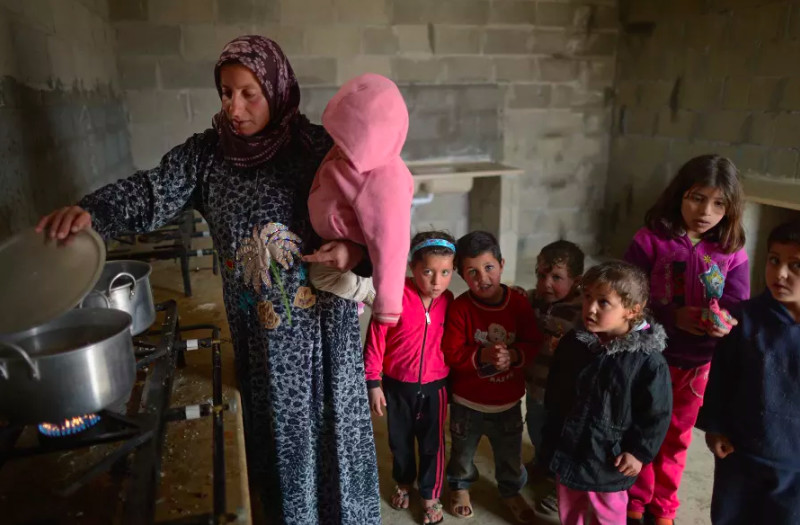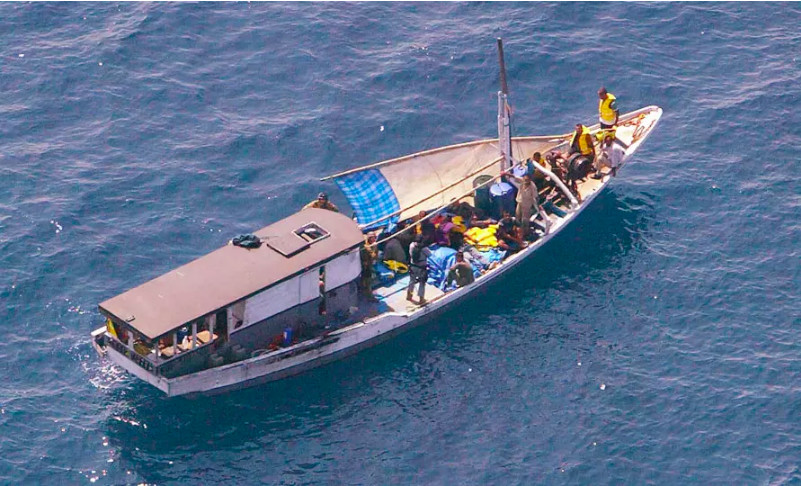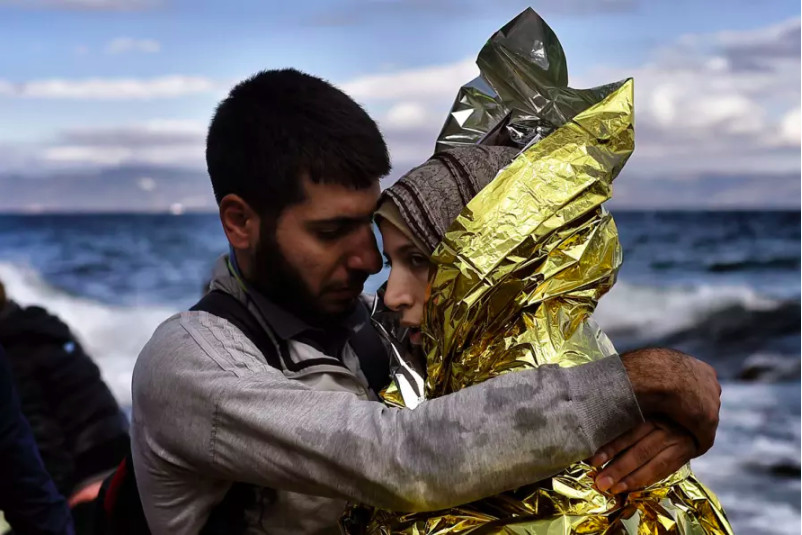
Politics & Society
How did it come to this?

As Australians go to the polls, we lack a robust debate on the human rights implications of our border protection policies in light of Australia’s refugee and human rights responsibilities.
Published 14 May 2019
Among Australia’s political leaders and members of the major parties, there remains a worrying failure to openly discuss Australia’s obligations under the Refugee Convention.
Neither is there a willingness to engage in a robust debate on the human rights implications of our border protection policies in light of Australia’s refugee and human rights responsibilities.

Also missing is an appreciation of the relatively low numbers of refugees coming to this country as a proportion of Australia’s overall migration intake, and as a proportion of the numbers of displaced persons and refugees globally.
This failure to talk about the global context distracts us from the reason why people take risks to seek protection – there are only enough resettlement places in signatory states to accept approximately 1% of the world’s refugees under the UNHCR mandate. Policy engagement on this issue tends to be superficial.

Politics & Society
How did it come to this?
COALITION
The Coalition is committed to a deterrent, punitive model of border protection which effectively undermines fundamental elements of the Refugee Convention for those seeking refuge without a valid visa. It will impose a ceiling of 18,750 resettlement places under the Humanitarian Visa Program, and it continues the legacy and policies of Operation Sovereign Borders, introduced by the Abbott Coalition Government in 2014, under the direction of then Immigration Minister, and now Prime Minister, Scott Morrison.
Under this policy, increased powers were given to the navy to intercept boats at sea and to engage in boat ‘tow backs’. Conditions worsened in offshore processing centres, and gag orders, now no longer applying to health professionals were imposed on those working in detention from speaking out about conditions in the centres.

This policy also subjected those arriving by boat without a valid visa to ‘fast track processing’ through the Immigration Assessment Authority. This is a more limited review process than that previously available under the Administrative Appeals Tribunal (Refugee Review Tribunal) and appeared aimed at expediting rejections and removals rather than guaranteeing due process.
The Government has recently reduced protections for asylum seekers living in Australia, despite continuing with massive expenditure on detention and border protection. The ‘savage’ cuts to Status Resolution Support Services for asylum seekers either on Temporary Protection Visas, or in community detention, while their status is being determined has led to homelessness and destitution for many asylum seekers and their families.

Politics & Society
The war on boats: Let’s bring facts to national conversation
Coalition policy (key points):
· Retain Temporary Protection Visas (TPVs)
· Continue with cuts to Status Resolution Support Services for asylum seekers
· Retain current offshore processing arrangements
· Ensure those treated under the Medevac Bill don’t resettle in Australia
· Repeal Medevac Bill by July 2019
· A ceiling of 18,750 resettlement places under the Humanitarian Visa Program
· Close Christmas Island Detention Centre
· Increase funds for Regional Cooperation Arrangement in Indonesia
· Continued commitment to expenditure on indefinite immigration detention

THE LABOR PARTY
The Australian Labor Party is clearly adopting policies which depart from those of the Government, while insisting on its ‘tough on people smugglers’ approach. Its rhetoric on people smuggling closely aligns with the Coalition’s tough border protection stance in tone, stating a belief in ‘strong borders, offshore processing, regional resettlement, and “boat turn-backs when safe to do so because we know it saves lives at sea”.

Politics & Society
Nowhere people have a right to somewhere
Labor’s resolve on this issue is stated as absolute – “the way to Australia through irregular means by boat is closed, and it will remain so under Labor”.
However it deviates from Coalition policy in significant ways. Labor has made a financial commitment to better support asylum seekers, working with the UNHCR to commit $450 million over three years in the region, and will increase the number of humanitarian places to 27000 per annum by 2025..
It will end Temporary Protection Visas (TPVs), addressing the state of limbo and extensive hardship for refugees and asylum seekers living in community, often without means of support, housing and services.
Labor proposals are important moves towards fulfilling the spirit and aims of the Refugee Convention.

Labor policy (key points):
· Spend $450 million over a three year period to support UNHCR activities, globally and in the region (South East Asia and the Pacific)
· Increase humanitarian intake to 27,000 places per annum
· Appoint an independent children’s advocate to represent interests of refugee and asylum seeker children and ensure mandatory reporting of child sexual abuse in immigration detention
· Limit detention to 90 days
· Reinstate access for all asylum seekers to the Refugee Review Tribunal
· Abolish Temporary Protection Visas
· Explore regional resettlement options with New Zealand

Politics & Society
What is a refugee?
THE GREENS
The Greens’ policy presents a clear contrast to both major parties, while unsurprisingly sharing more in common with Labor than with the Coalition. The party calls for an end to offshore processing and a dramatic increase in humanitarian places.
Its demand for a Royal Commission into Australian Immigration Detention Centres reflect long standing concerns by human rights and other advocacy bodies about the sustained evidence of human rights abuses and resulting instances of self-harm, mental illness and suicide among detainees.
The Greens’ commitment to addressing these harms is also evident in its proposals for a ‘robust independent inspectorate’ to monitor human rights obligations across all detention centres, including those offshore.
The Greens want increased income and housing support, as well as giving asylum seekers and refugees access to Medicare, counselling, English language courses and support to find work, bringing policy into line with the programs in place in the 1970s.
The Greens policy most closely reflects the spirit and aims of the Refugee Convention.

Greens policy (key points):
· Close offshore detention, saving $1.9 billion in government spending over four year period
· Focus on a ‘genuine’ regional solution for timely processing of claims for refugee protection/
· Increase in humanitarian intake to 50,000 per annum
· Abolish Temporary Protection Visas
· Introduce Permanent Refugee Protection Visas
· Impose a seven-day limit for onshore detention
· Restore Status Resolution Support Service (SRSS) payments to the same rate as Newstart
· Create a private sponsorship program for refugees
· Call for a Royal Commission into Immigration Detention

Politics & Society
No country, no rights, no hope
The impact of refugee policy on voting intention is a strong consideration for political parties, complicated by the evidence that political parties don’t always reflect the views of those voting for them. Analysis from the ABC’s Vote Compass also shows that there remain deep divisions in the electorate over whether or not boats with asylum seekers should be turned back.
The volatility of electoral attitudes on this issue was made clear during the 2001 election when the Howard government capitalised on community anxieties about ‘boat arrivals’ by making claims, which after the election would prove to be false, that refugees at sea had thrown their children overboard in a bid to gain asylum. The incident became known as the ‘Children Overboard’ Affair’ and is widely believed to be a factor in the government retaining office.
Those in detention are suffering in difficult conditions that have been imposed on them because of misinformation and the presumption that they are ‘illegal’ and therefore criminal.
There have been 12 deaths at Manus Island and Nauru, many of these preventable, and attributable to a ‘tough on borders’ approach.
As Australians go to the polls on Saturday these are the uncomfortable facts we need to confront.
A version of this article also appears on Election Watch.
Banner: Getty Images